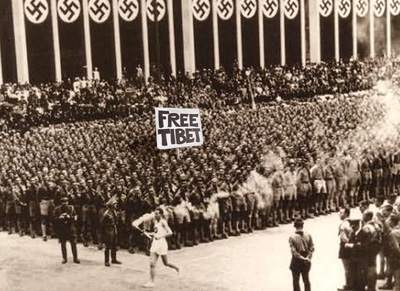John Button's spirit at the 2020 Summit regarding forests: 'Woodchipping's a bastard of an industry'
Mood:
 crushed out
Topic: aust govt
crushed out
Topic: aust govt
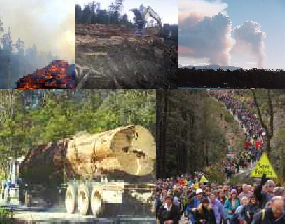
Alan Ramsey tipped off the broader political community last Saturday side column of the impending death of this retired federal ALP politician, a Truman Capote figure of a man in physical stature at least. A pollie who later said he would have preferred to be a journo as his son did become.
He presented as small and yet perfectly formed. By all accounts he was whimsical and disarmingly honest and direct. He was very big in "horsepower" outgrowing his own body in wit, intellect, fierce independence in the factions.

Make no mistake he was tough as ALP Senate leader and Industry Minister for Australia 1983 until 1993 when he retired. People respect strength, not least of character. Now the Big Media and Big Politics are moving through their own shock on a human level at his final departure, to the next phase of cannonisation of an important life completed. It will be in all the press today.
Fred Chaney as former Senate Coalition Party leader in the 1980ies was on abc radio last night saying he envied the talents of his rival Button. now that's a compliment.
Yesterday Crikey.com.au ran a dignified obit with no byline here, waiting they later said for something more worthy again. And sure enough later in the day, unusually they broadcast a second obit stand alone from former PM Paul Keating:
Dear Sole Subscriber,
Former Labor senator John Button died overnight at 74. We were waiting for a fitting tribute, then along came Paul Keating. This is what he thought:
John Button is a real loss to the country and the Labor Party alike.
A lawyer who inhabited the centre ground of Victorian Labor politics, he was material in returning the pendulum of Labor politics from the left, where it had stuck fast for a quarter of a century, to the political centre.
A consequence of his work within the Independents’ group was the advent of the Cain Labor government and with that change, the underlying fabric of Victorian politics returned to the Labor fold, where it has more or less remained, for just on thirty years.
A person needs a lot of horsepower to be at the forefront of such a change, and while it was not all John Button’s work, he left his fingerprints on all the important bits.
In his prime, he was more or less despised by the left and the right. In the swing position, he played corner politics with cunning and élan. Some would say too cunning, others mercurial, while the impartial onlooker might say inspired.
As a Senator, he was a member of the post-Whitlam government group lead by Bill Hayden in 1977. That group, the reform ministers of the 1980s and early 1990s, came together as a coherent unit out of conviction borne by the defeat of the Whitlam government and the fact that post-War growth, worldwide, had collapsed from the mid 70s in the context of hyperinflation.
John Button like every other member of the group knew that the old closed way for Australia, the old Australian economic defence model was coming to an end. Like the rest of us, he was not sure what should take its place but he knew it had to be something competitive and more open.
As a person with a background in legal issues, including such things as civil liberties, it was a surprise to us all that he asked Bob Hawke for the Ministry of Manufacturing Industry. I remember going to his office after our swearing in and saying ‘what are you going to do with this job?’ He said ‘I dunno; something! God knows, something needs to done.’ Pretty much reflecting the mood of most of us.
Button was a case book example of giving a complex job to a person with a good mind, one formerly unsullied by its complexities, leaving the mind to sift through the issues, while coming to a new set of conclusions. As it turned out, he was the Minister for Manufacturing Industry at the fulcrum point of that industry’s development and history.
He and I had great battles over tariffs and for the tariff reductions announced in the May Statement of 1988 and the Industry Statement of 1991. But he knew the reform mantle meant he had to see his constituency’s interests in a longer term perspective. I remember calling him at home one Saturday morning in 1991, urging on him a further reduction in general manufacturing protection to 5% by the year 2000. I said ‘come on John, in for a penny, in for a quid’ and in a measure of all that was good and brave about him, he said ‘why not?’.
He drove a hard bargain at the Cabinet table on adjustment packages for particular industries, perhaps best known being the car industry, but being prepared to play the game, whilst being charming with it, I found him, at once, exasperating yet irresistible.
He was a fully paid up and foundation member of the reform group of ministers, the one that changed Australia forever. Deep personal losses in John’s life meant his heart and mind were always vulnerable to issues which affected the needy or those less well off.
He had a large group of friends and political associates and of course, many he picked up in his lifelong support of the Geelong Football Club. He was a warmly regarded person, yet for all that, he was always a loner. An intellectual loner and a political loner. None of us held that against him, because the same epitaph may be stuck to so many of us.
For all that, he held firmly to one idea throughout his life, and that was that political life was the highest calling, within which great things could be done; where the greatest leverage existed. And as his life’s work attests, he stuck to that idea with enthusiasm and perseverance.
John Button is gone but he will not be forgotten, inasmuch that at some point, we are all forgotten. Those of us who were close to him will always remember his penchant for devilment, for the zany and the unpredictable, but also the fun in being around such a quixotic character.
PJ Keating
8 April 2008
Another ex Prime Minister Bob Hawke was also on the vision last night and there was something quite moving at the pause and the humility on the face of the often swaggering "silver bodgie'.
As a younger wonky activist in harness for The Wilderness Society in 1992 we first came to learn who John Button was. The national campaign team under Director Karenne Jurd were all in a twitter in the old St James lane office (rented off the Teachers Union or was it the MUA?) just down from the Sussex St ALP head office in China Town.
The excitement was around Button who had spoken: He told a press conference somewhere on the subject of the woodchipping industry that destroys natural forest to this very day under the ALP:
"It’s a bastard of an industry."
And why wouldn't he tell the truth about that? The hard impartial evidence was in. The 3 volumes of the Forest & Timber Inquiry report of the Resource & Assessment Commission 1992 was done with research led by Dr Clive Hamilton. RAC reported amongst so many other gems that there was not one example of 'ecologically sustainable native forest logging' to be found in the whole of Australia.
This is what Ian Cohen MLC was referring to in Hansard in 1998 just prior to the March 1999 NSW state election here.
In 1992 onward this was the shudder that went through the whole corrupt rotten logging industry led by such grubs as Gavin Hillier, national logging unionist, recently spotted trawling racialised filth out at Camden prior to the last federal election:
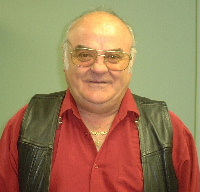
12th March 2008 Gavin Hillier, prominent retired logging unionist on Stateline footage as protester no.5?
Mood:  caffeinated
caffeinated
The pithy Button statement was in context of federal cabinet discussion to that point too. Back in 1991 cabinet had a meltdown and backed off allocating public natural heritage forests to private profit interests rent seeking "resource security". Which actually means refusing to buy their own land with sufficient rainfall to grow their own tree farm timber. No, they demanded intensified destruction of the public estate via unprecedented highly mechanised job destroying woodchip operations.
And why wouldn't federal cabinet refuse such rent seeking after reading a briefing note like this from The Wilderness Society that helped get them over the line in 1987, 1990 and by default in 1993?
But the industry learned from their defeat. They copied the TWS grassroots model creating a front group filled with client employees called Forest Protection Society - a breach of s.52 of the Trade Practices Act. Then they renamed FPS to Timber Communities Australia funded in large part by National Association of Forest Industries. Later PM John Howard's senior staffer Catherine Murphy became their CEO.
The loggers as opposed to the timber industry proper (mostly already in plantations in volume and job numbers) lobbied hard with 'timber truck' blockades taking time out from feeding Eden ChipMill. They demanded 'resource security' again in 1994 in Canberra. Bob Carr on a high profile forest protection platform was elected in March 1995 promising to close the Eden chipper in a ferocious blowback against the loggers but the ALP federally under Keating in Canberra tragically lost their way. Button was gone. Faulkner as Environment Minister was outnumbered. Keating fell to Howard in 1996.
The RAC report and Button's honest interpretation was perverted into a weasel words National Forest Policy Statement from 1993-1995. Then the NFPS transmogrified into 'Regional Forest Agreements' (with no agreement) and the holy grail of 20 year resource security for private industry in public forests, the browns of the ALP ascendant, hand in glove with dinosaurs of the National Party.

As gracious as PJ Keating's soliliquy above for Button's life and career above reads, the ALP under his leadership failed to confront union/industry rent seeking liars and thugs and the electorate's respect was soon to follow. Who could condone this kind of thuggery by the logging union, emboldened by the same PM Howard's dinosaur values 1996-2007?:
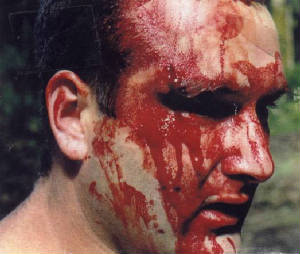
6th Dec 2006 - New paper: Logger terrorism under the Howard federal government
Paul Keating was later to say he regretted not doing 'more on the environment'. Regrets of course are as human as life and death itself, not least some 80 million tonnes of natural forest exported as woodchips 96-08.
We wrote yesterday on crikey comment string about John Button:
Tom McLoughlin
Tuesday, 8 April 2008 3:59:09 PM
Very sad to suffer this manner of death. What a full life. He reminds me of a character from fiction - I think it was in Beau Geste (?), on the boat trip escaping Britain - a little guy is getting bullied by the sloven, loud mouth ship's cook. So little guy invites this thug out onto the deck and puts on a display of technical boxing excellence for all the sceptical roughnecks on board. By the end everyone was cringing for the big guy totally outclassed, demolished. John Button seemed to come across like that. A class act. Big on the inside. Quality ALP. Like Nifty in his heyday I suppose. Apparently he actually wanted to be a journalist, as his son did become one? Condolences to his family and his mates.
In 2004 Mark Latham as then ALP Opposition Leader did the intellectually honest thing on such magnificent world heritage quality forests in Tasmania, and given the real economics as opposed to the corporate welfare of special interests: How many of these brave scientists listed here back in 2004 will be at the 2020 Summit later this April 2008?:
21/9/04...ABC Earthbeat ventillates real scientitic consensus for Tas forest protection with text of scientists' letter and huge signatory list
While the thugs in the logging union hierarchy in 2004 did the wrong thing and got away with the ecological and electoral betrayal:
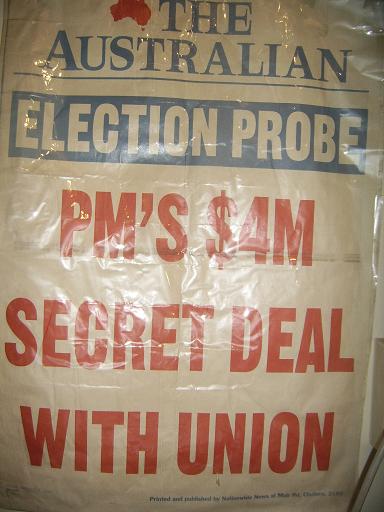
And what plays for public land use policy in Tasmania applies in East Gippsland and NSW still. The woodchipping industry as John Button has said is a bastard of an industry:
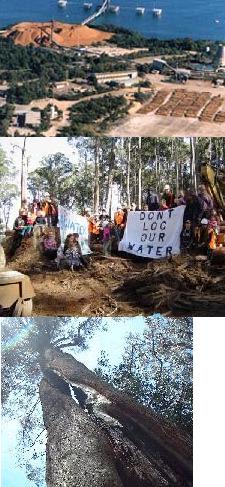
In 2007 before the true shock wave on dangerous climate change had really been demonstrated in the electorate we made this report:
Tuesday, 31 July 2007
That was then. This is now. The planet can't wait Prime Minister, the challenge is only getting harder the longer you put this structural reform off to shut out the dinosaur woodchipping industry from natural forests, while the vast majority of the industry is based in existing plantations with most employment. Stop subsidising privte industry with public land Mr Rudd!
None of this is easy but the Rudd Govt were elected to do the hard stuff, just as John Button did with his celebrated industry plans. There are these competing agendas here about logging internationally versus the destructin here at home. Perhaps Button would say two wrongs don't make a right.
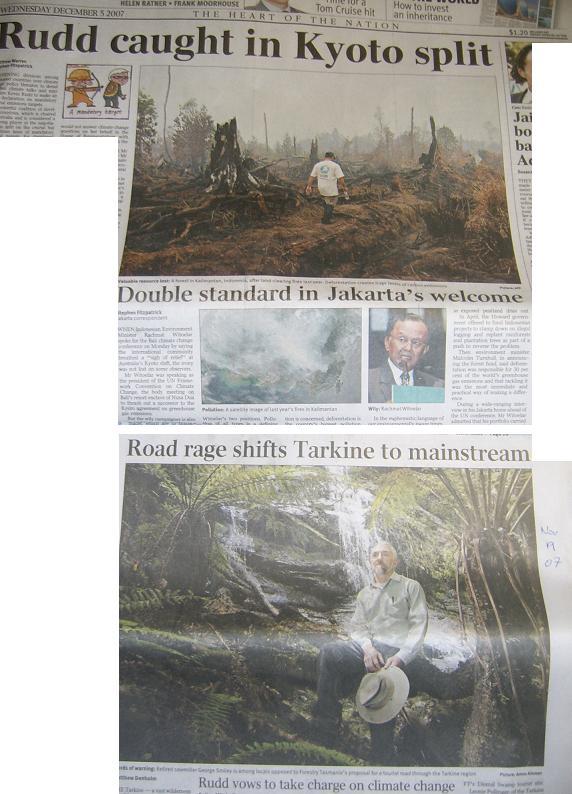
And notice this high level scientific advice. Another absentee from the 2020 Summit?
[December 2007] New Australian Forest Science - Released at UNFCC Bali Conference From Adrian's Zero Emission Bali Blog. For more blogging see: www.zeroemissionnetwork.org.au
"The last event of the night was run by The Wilderness Society. It included a presentation of the excellent work by Brendan M Mackey from ANU on determining the natural Carbon Carrying Capacity (CCC) of different forest types in the South East Australia. His work builds on the previous data for the forests of SE NSW and the E. ragnans (Mountain Ash) forests.
Prof Mackey stated that Natural CCC was underestimated everywhere because foresters and forestry data is used as bases for calculating natural CCC. This is shown in the significant difference between between CCC calculations by the IPPC, 60 t C ha-1 yr-1 average for a temperate forest and Mackey's work which produces an average of 670 t C ha-1 yr-1.
This work relates directly to one of the key focuses of the Bali meeting which is the debate around reducing emission from deforestation and degradation (REDD).
Prof Mackey makes the point that current GREEN carbon (living terrestrial biomass and soil carbon) is not accounted for, unlike BLACK (fossil fuels), BROWN (agriculture and plantations) or BLUE (atmospheric and ocean) and that we must have definition of green carbon so we can actually see it in the context of action on climate change and REDD. Prof Mackey defined degradation of a natural system as any action that reduces its CCC.
One exciting bit of work the Zero Emission Network has been doing with Prof Mackey's previous data, was showing that if the forestry sector was included in a carbon pricing mechanism (either tax for trading) with a minimum price of $10 or more a ton of C the native forest industry would collapse over night. This new research seems to support this.
The report is currently only in limited release, but people interested in it should contact 
The second part consisted of a talk about the challenges of protecting one of the world's last natural substantial tropical rainforests, the forest of Aceh, protected for many years by a succession war run out of the jungle. Here the main drivers of destruction are palm oil plantations destroying lowland peat swamp forests, and illegal logging. However there are some positive programs including the elephant patrol which consists of former Acehnese fighters that patrol the jungles looking for illegal logging on the back of elephants."
.......................................
Here is some more feedback from author Tony Kevin on another of the fairly subjective selection outcomes for the 'best and brightest' 2020 Summit (following other impertinent deconstructions of the Sustainability selection group), and doens't the 5th estate blogosphere do straight talking impertinence well - John Button always opposed to "dullness" would surely approve?:
Here is a case study. In the group on "Australia’s future security and prosperity in a rapidly changing region and world", chaired by Michael Wesley, in a field I thought I was reasonably familiar with (foreign policy and national security); I think I recognized only about 28 from the 90 names, and I know personally about half of those. I feel a bit uncomfortable not recognizing the names of over 60 people - I must be really out of touch. (I thought perhaps I had failed to recognize international trade specialists - not my field - but then I saw that is part of an economics-oriented committee). Here are some of the names not on the list for the 'foreign affairs and security' committee -commentators and writers Bruce Haigh, Peter Mares, Dick Woolcott, Allan Behm, Nic Stuart, activists Helen Caldicott, Sue Wareham, Margo Kingston, controversial persons Andrew Wilkie, Lance Collins, Richard Butler and yours truly, academics Owen Harries, Coral Bell, Alison Broinowski, Stuart Harris, Tony Milner, Desmond Ball. Of course some of these - myself included - may not have applied. And most of my names here are over 55s. I wish the summit well. In crikey.com.au 'Your say' section 7th April 2008
Posted by editor
at 6:33 AM NZT
Updated: Wednesday, 9 April 2008 11:22 AM NZT
